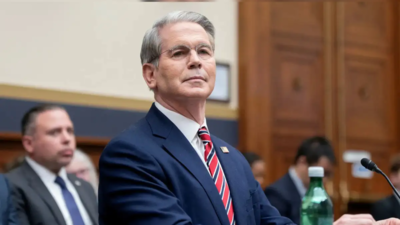ARTICLE AD BOX

The US will not fast-track trade deals simply to meet deadlines, Treasury Secretary Scott Bessent has said, signalling that the Trump administration remains focused on securing high-quality agreements even as a key tariff deadline approaches.In an interview with CNBC, Bessent stated, “The Trump administration is more concerned with the quality of trade agreements rather than their timing. We're not going to rush for the sake of doing deals.” The remarks come ahead of the August 1 deadline, when tariffs on several US trade partners could kick in if talks fail to yield progress, according to an ET report.While describing the ongoing negotiations as “moving along,” Bessent warned that failure to reach agreements could escalate trade tensions.
“If we boomerang on August 1 tariffs, higher tariffs could put more pressure on countries,” he said.Allies under pressure as US sticks to its termsBessent pointed to growing engagement from the European Union, noting, “They’ve become more engaged,” and said he expects Brussels may aim to speed up negotiations. “I imagine they would want to negotiate faster,” he added.On Japan, Bessent clarified that Washington’s focus remains firmly on securing the best outcomes for the US, not adapting to domestic political calendars in partner countries.
“Our priorities are not internal government but best deals for U.S.,” he said.Despite the approaching deadline, Bessent expressed confidence in the ongoing discussions. “Trade is in a good place,” he said.Russia tariffs tied to political goalsTouching on Russia, Bessent acknowledged that tariff measures can go beyond trade. “Tariffs can be a means to political ends,” he said, referring to current conversations around sanctions.He also hinted at a possible joint strategy with allies, saying, “Would urge Europe to follow us if we implement secondary tariffs,” without naming affected sectors or timelines.China discussions may restart, focus on overcapacity and oilOn China, Bessent said talks could resume “in the near future,” but flagged overcapacity as the primary concern. “The elephant in the room with China is overcapacity,” he said, mentioning steel and solar as key pressure points.He also pointed to two new areas of concern that may enter future negotiations—Beijing’s trade ties with Russia and its stance on Iranian oil. “Could start talking about Iranian oil,” Bessent said, while adding that the US “could discuss [China’s] trade with Russia” as part of broader diplomatic talks.



.png)
.png)
.png)
















 3 hours ago
4
3 hours ago
4







 English (US) ·
English (US) ·